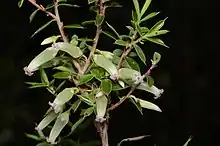| Styphelia biflora | |
|---|---|
 | |
| Near Goondiwindi | |
| Scientific classification | |
| Kingdom: | Plantae |
| Clade: | Tracheophytes |
| Clade: | Angiosperms |
| Clade: | Eudicots |
| Clade: | Asterids |
| Order: | Ericales |
| Family: | Ericaceae |
| Genus: | Styphelia |
| Species: | S. biflora |
| Binomial name | |
| Styphelia biflora | |
 | |
| Occurrence data from AVH | |
| Synonyms[1] | |
Styphelia biflora is a species of flowering plant in the heath family Ericaceae and is endemic to eastern Australia. It is an erect to spreading shrub with hairy branchlets, oblong leaves and small white flowers.
Description
Styphelia biflora is an erect to spreading shrub that typically grows to a height of 0.4–2 m (1 ft 4 in – 6 ft 7 in) and has bristly hairs on the branchlets. The leaves are glabrous, oblong, more or less flat, 9–17 mm (0.35–0.67 in) long, 2.0–2.7 mm (0.079–0.106 in) wide and sessile. The flowers are arranged singly or in pairs in leaf axils on a peduncle 1.0–1.5 mm (0.039–0.059 in) long with bracteoles 1.2–1.6 mm (0.047–0.063 in) long. The petals form a tube 2.5–3.7 mm (0.098–0.146 in) long with lobes 3.2–3.6 mm (0.13–0.14 in) long and hairy near the ends. Flowering occurs from July to October and is followed by glabrous, elliptic drupes 3.2–3.7 mm (0.13–0.15 in) long.[2]
Taxonomy
This species was first formally described in 1810 by Robert Brown who gave it the name Leucopogon biflorus in his Prodromus Florae Novae Hollandiae.[3][4] In 1824, Kurt Polycarp Joachim Sprengel transferred the species to Styphelia as S. biflora in Systema Vegetabilium.[1][5] The specific epithet (biflora) means "two-flowered".[6]
Distribution and habitat
Styphelia biflora grows in woodland, sometimes on rocky outcrops and occurs in south-east Queensland and as far south as Dunedoo in New South Wales.[2][7]
References
- 1 2 3 "Plants of the World Online". Plants of the World Online. Retrieved 4 October 2023.
- 1 2 Powell, Jocelyn M. "Leucopogon biflorus". Royal Botanic Garden Sydney. Retrieved 18 May 2022.
- ↑ "Leucopogon biflorus". APNI. Retrieved 18 May 2022.
- ↑ Brown, Robert (1810). Prodromus Florae Novae Hollandiae. London. p. 545. Retrieved 18 May 2022.
- ↑ Sprengel, Kurt P.J.; von Linné, Carl (1825). "Pentandria, Monogynia, Syphelia". Systema Vegetabilium. 1: 659. Retrieved 5 October 2023.
- ↑ Sharr, Francis Aubi; George, Alex (2019). Western Australian Plant Names and Their Meanings (3rd ed.). Kardinya, WA: Four Gables Press. p. 146. ISBN 9780958034180.
- ↑ "Leucopogon biflorus". Atlas of Living Australia. Retrieved 18 May 2022.